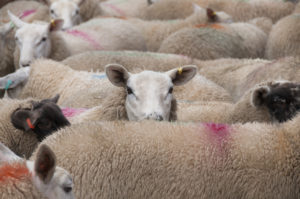Lamb prices jump up
Throughout the past week lamb prices have increased sharply, with the weekly liveweight SQQ up almost 20p.
During the week ending 10 November the GB NSL liveweight SQQ increased to 269.05p/kg. Such sharp movement is uncommon and usually follows, or is followed by a correction, unless throughputs are low, leading to volatile prices.
Sharp movements are rarely sustained in the lamb market. There are two previous occasions in recent times, but both were downward price movements.
The first was in March 2020 when the old season lambs SQQ dropped suddenly overnight as the UK and France both entered their first pandemic-related lockdowns.
The other occasion was more recent and perhaps for less obvious reasons; in June 2021 lamb prices dropped sharply as they came off the record-breaking high spring price peak.
In the week ended 6 November the GB NSL deadweight SQQ rose 23p, to 556.5p/kg. Estimated kill for the week recorded a decline of 15%, to 221,000 head.
Rebecca Wright / AHDB
